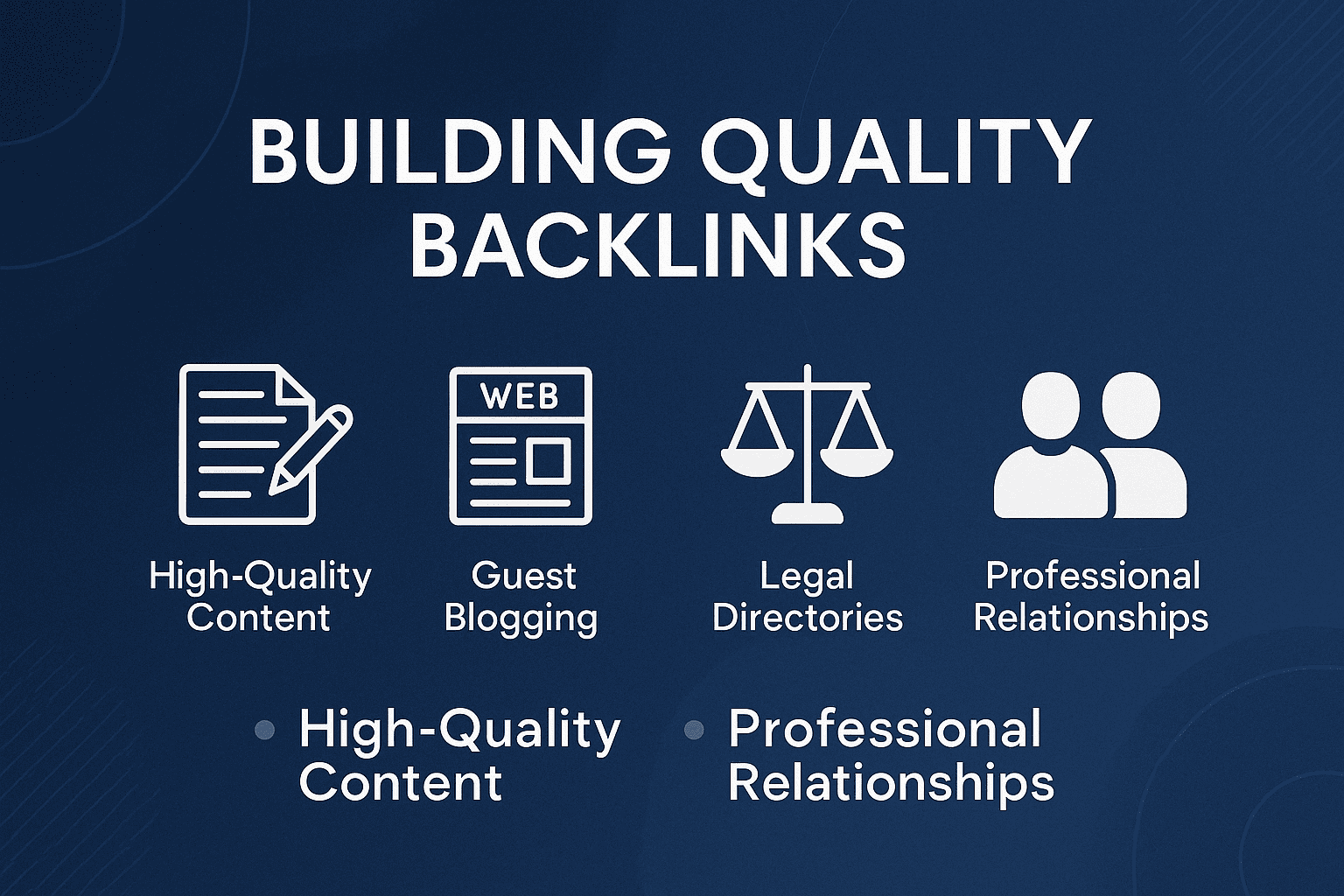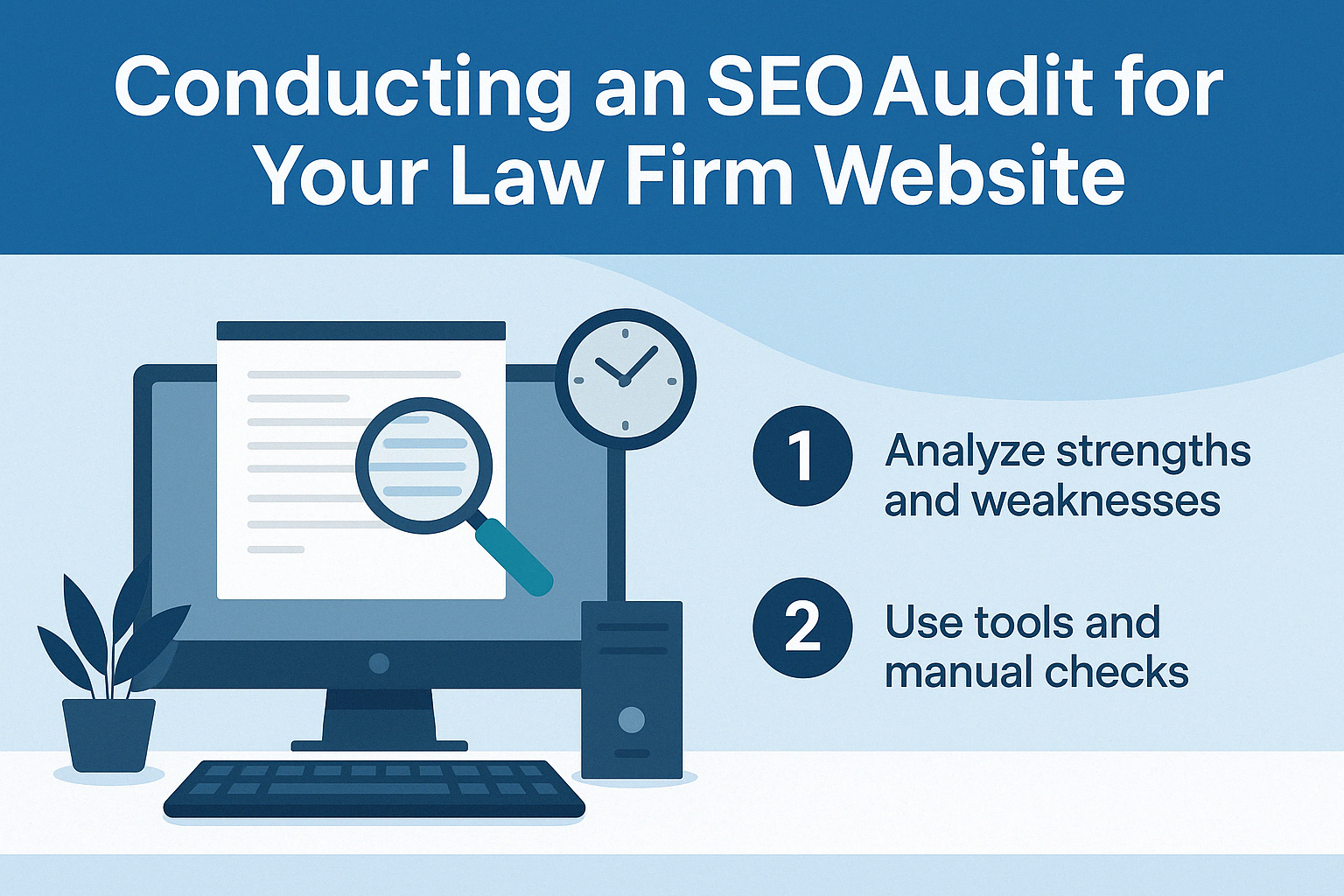Is your law firm’s website struggling to generate relevant traffic or quality leads? It may be time to evaluate your site’s search engine optimization (SEO) and implement SEO for law firms. SEO for lawyers is a powerful way to rise in search results. A strong SEO strategy helps establish your law firm as an authority in your field. By consistently appearing in top search results and providing valuable content, you build trust and credibility with potential clients. This perceived expertise is crucial in the legal industry, where trust is a key factor in a client’s decision-making process.
Let’s examine the principles of SEO for law firms, how you can audit your legal SEO, and the best practices when leveraging SEO for lawyers.

SEO for lawyers in 2026 offers law firms a proven path to greater online visibility and client acquisition. Search engine optimization for lawyers combines core practices like local optimization and technical excellence with new Generative Engine Optimization (GEO) approaches. Seo for law firms that embrace these updates see improved rankings in traditional results and increased citations in AI-powered answers. Whether refining seo for lawyer campaigns or building comprehensive seo law firm strategies, focusing on E-E-A-T, local signals, and structured content delivers sustainable growth for law firm SEO initiatives.
Key Points
- Research suggests SEO is crucial for law firms to attract clients online, with local SEO being especially important for visibility.
- It seems likely that technical SEO, like fast website loading and mobile-friendliness, boosts rankings, though results vary by competition.
- The evidence leans toward leveraging local SEO, such as Google Business Profiles, to appear in local search results, enhancing client discovery.
- Developing an effective SEO strategy involves keyword research, content optimization, and link building, but success may take time.
- Tracking SEO results can be done using free tools like Google Analytics, with ROI often measurable over months or years.
- Local SEO is vital as most legal searches are location-based, helping firms stand out locally, though effectiveness depends on reviews and citations.
- In 2026, search engine optimization for lawyers includes Generative Engine Optimization to ensure visibility in AI-driven search experiences.
- Seo law firm success on a budget is achievable through consistent local optimization and targeted content updates.
- 1Understanding SEO for Lawyers
- 2SEO Trends for Law Firms in 2026: Embracing Generative Engine Optimization
- 3Key Components of Law Firm SEO
- 4Developing an Effective SEO Strategy
- 5Leveraging Local SEO
- 6Technical SEO for Law Firm Websites
- 7Building Quality Backlinks
- 8Conducting an SEO Audit for Your Law Firm Website
- 9Measuring SEO Success
- 10Common SEO Mistakes to Avoid
- 11FAQs
- 12Final Thoughts
Understanding SEO for Lawyers
SEO, or Search Engine Optimization, helps law firms rank higher on search engines like Google, making it easier for potential clients to find you. For law firms, this is critical as many clients search online for legal services. Here’s a breakdown of key aspects:
Why SEO Matters
SEO is a free marketing channel, meaning you don’t pay for clicks or rankings, unlike ads. It targets traffic precisely by using keywords related to your services, ensuring visitors are likely to need your help. Over time, optimized content can continuously boost visibility, creating a compounding effect.
Search engine optimization for lawyers provides long-term benefits that compound as your authority grows. Seo for law firms focused on quality delivers consistent, high-intent leads without ongoing ad spend.
Local SEO Importance
Local SEO is especially vital for law firms, as 96% of people needing legal advice search online, and many use location-based queries like “divorce lawyer near me.” Appearing in Google’s local 3-pack (map pack) increases visibility for local clients, with client reviews and citations enhancing trust and rankings.
Local signals remain the cornerstone of seo for lawyers because legal services are inherently geographic. Strong local performance drives the majority of client inquiries for most practices.
Budget Considerations
For firms on a budget, SEO can be done in-house using free tools like Google Keyword Planner and Google Analytics. DIY strategies, such as optimizing your Google Business Profile and blogging monthly, can be effective, though hiring experts may be necessary for competitive markets.
Many attorneys achieve meaningful seo for lawyer results through focused DIY efforts, proving that seo law firm growth doesn’t always require large budgets.
SEO Trends for Law Firms in 2026: Embracing Generative Engine Optimization
In 2026, traditional law firm SEO is being supplemented by Generative Engine Optimization (GEO). With AI tools like ChatGPT, Perplexity, and Google AI Overviews handling a growing share of research queries, seo for law firms now requires content that is easily citable by AI systems. Approximately 28% of potential clients use AI platforms when researching attorneys, making GEO a key component of modern search engine optimization for lawyers.

GEO builds on core SEO principles but emphasizes structured, authoritative, and unique insights that AI engines love to reference. For seo law firm strategies, this means creating content with clear headings, statistics, quotations, and declarative language while demonstrating strong E-E-A-T.
Here’s how traditional SEO compares to GEO for seo for lawyers:
| Traditional SEO Focus | Generative Engine Optimization (GEO) Focus |
|---|---|
| Keyword density & on-page signals | Authoritative tone, unique data, citations |
| Backlinks for authority | Structured answers AI can easily parse |
| Ranking in SERPs | Being cited in AI summaries & chat responses |
| Mobile speed & Core Web Vitals | Entity-rich content & schema markup |
Key Components of Law Firm SEO
Law firm SEO involves optimizing your website to rank higher in search engine results, attracting potential clients. The key components include:
- Keyword Research: Identify relevant terms like “personal injury lawyer in Colorado” using tools such as Google Keyword Planner. Long-tail keywords (e.g., “Miami personal injury lawyer”) target specific services and locations.
- Content Optimization: Enhance blog posts, landing pages, and FAQs with keywords. High-quality content establishes your firm as an authority, boosting engagement and rankings.
- Link Building: Acquire backlinks from high-authority sites like Avvo or Justia via digital PR or guest posting to improve credibility.
- Local SEO: Optimize for local searches to appear in the local 3-pack by managing your Google Business Profile and directory listings.
- Technical SEO: Ensure fast load times (under 2.5 seconds), mobile-friendliness, and proper HTML tags, all critical Google ranking factors.
- Organic vs. Paid SEO: Organic SEO offers long-term benefits, while paid SEO (e.g., PPC) provides instant visibility.
- GEO Enhancements: Create citation-worthy content for AI visibility.
In 2026, law firm SEO also requires attention to Generative Engine Optimization as clients increasingly rely on AI for initial research.
On-site vs. off-site elements for seo law firm success:
| On-Site SEO Elements | Off-Site SEO Elements |
|---|---|
| Content Quality and Relevance | Backlinks and Their Quality |
| Keyword Optimization | Social Media Presence |
| Website Structure and UX | Directory Listings and Profiles |
| GEO-Friendly Structure | Local Citations and Reviews |
Developing an Effective SEO Strategy
A successful SEO strategy for law firms combines on-site and off-site optimization tailored to your goals. Steps include:
- Website Indexing Check: Use Google Search Console to ensure proper indexing.
- Keyword Optimization: Research keywords like “seo for law firms” with tools like Ahrefs and optimize content accordingly.
- Content Creation: Build pillar content and FAQs to add value and improve rankings.
- Technical SEO: Fix site speed and structure issues using Ahrefs Site Audit.
- Link Building: Gain backlinks from authoritative sites via guest posts (Learn More).
- Local SEO: Optimize your Google Business Profile and ensure consistent NAP across directories.
- Track ROI: Use Google Analytics to measure results over time.
Effective seo for lawyer strategies in 2026 also weave in GEO principles from day one to future-proof your efforts.
Leveraging Local SEO

Ranking in the local pack drives calls and visits
Local SEO for law firms remains the highest-ROI component of seo for lawyers in 2026. Strategies include:
- Google Business Profile: Optimize with accurate details to rank in the local 3-pack (Guide).
- Local Directory Listings: List in directories like Avvo and use Brightlocal for management.
- Client Reviews: Encourage reviews on Google to boost local rankings (Tips).
- Locally Relevant Backlinks: Build links from local sites via digital PR (Learn More).
Technical SEO for Law Firm Websites
Technical SEO ensures your site is crawlable and rankable. Key strategies include:
Here’s a table of technical SEO best practices:

| Technical SEO Best Practice | Description | Tool to Use |
|---|---|---|
| Optimize Website Speed | Ensure site loads under 2.5 seconds to improve user experience and search rankings. | Google PageSpeed Insights |
| Ensure Mobile-Friendliness | Make sure site is responsive and works well on mobile devices. | Google Mobile-Friendly Test |
| Use HTTPS | Secure your website with HTTPS to build trust and improve rankings. | Google Search Console |
| Implement Schema Markup | Use schema markup to provide search engines with additional information about your content. | Google Structured Data Testing Tool |
| Allow AI Crawler Access | Permit GPTBot and similar crawlers for GEO visibility. | robots.txt check |
These technical elements support both traditional rankings and the demands of modern search engine optimization for lawyers.
Building Quality Backlinks
Backlinks are one of the strongest signals search engines use to evaluate the authority and credibility of your law firm’s website. For lawyers, backlinks from authoritative, industry-relevant websites such as legal directories (e.g., Avvo, FindLaw, Justia) and bar association websites can significantly boost rankings. Guest blogging on reputable legal or local community sites, publishing case studies, or earning mentions in legal news publications are also effective strategies.

Avoid spammy tactics like purchasing backlinks or participating in link schemes, which can result in penalties from Google. Instead, focus on creating valuable, shareable content and forming real relationships with other professionals in your niche or local community.
Building quality backlinks is crucial for lawyer SEO. Focus on high-quality content, guest blogging, legal directories, and professional relationships while avoiding low-quality links and buying schemes.
Ethical backlinks continue to play a major role in law firm SEO and overall search engine optimization for lawyers.
Conducting an SEO Audit for Your Law Firm Website
An SEO audit is essential for identifying performance issues and improvement opportunities. Start by checking whether your site is properly indexed using Google Search Console. Analyze keyword rankings to understand how your site performs for relevant search terms like “divorce attorney Raleigh” or “estate lawyer near me.”
Review on-page SEO elements such as meta titles, descriptions, header tags, and image alt text. Ensure all technical elements are optimized—your site should load in under 2.5 seconds, be mobile-friendly, and use HTTPS. Additionally, check for broken links, duplicate content, or outdated pages.

Use SEO audit tools like Ahrefs, Screaming Frog, or SEMrush to crawl your site and generate actionable insights. Prioritize fixing high-impact issues first, such as indexing errors, crawlability issues, or slow page speeds.
An SEO audit identifies strengths and weaknesses in your law firm website SEO using tools and manual checks, keeping your site competitive.
Regular audits are especially valuable as search engine optimization for lawyers continues to evolve with new algorithm updates.
Measuring SEO Success

Consistent SEO efforts typically show compounding results within 6–12 months
To determine the effectiveness of your SEO strategy, track key performance indicators (KPIs) over time. These may include:
- Organic Traffic: Monitor traffic from search engines via Google Analytics.
- Keyword Rankings: Track how your most valuable keywords are performing using tools like Ahrefs or SEMrush.
- Click-Through Rate (CTR): Evaluate how well your pages are attracting clicks in search results.
- Leads & Conversions: Measure form submissions, phone calls, and other lead generation actions tied to organic search.
- Bounce Rate & Time on Page: Understand how engaging your content is to visitors.
Use Google Search Console to identify performance trends and uncover new optimization opportunities. Over time, consistent growth in these KPIs shows that your SEO strategy is working and delivering value to your firm.
Common SEO Mistakes to Avoid
Even with good intentions, law firms can fall into common SEO traps that hinder results. These include:
- Keyword Stuffing: Overusing keywords in an attempt to rank higher can backfire, making content unnatural and spammy.
- Neglecting Mobile Optimization: Over half of all web traffic comes from mobile. If your site isn’t mobile-friendly, you’ll lose potential clients.
- Ignoring Local SEO: Not claiming or optimizing your Google Business Profile or failing to collect client reviews can cost you valuable local traffic.
- Duplicate Content: Publishing the same content across multiple pages can confuse search engines and hurt rankings.
- Lack of Fresh Content: Outdated content signals to Google that your site isn’t active. Regularly updating your blog with relevant legal topics keeps your site fresh.
Avoid these pitfalls by sticking to SEO best practices, focusing on user experience, and regularly auditing your site.
FAQs
Generative Engine Optimization (GEO) helps law firms get cited in AI search answers, expanding reach beyond traditional results.
GEO is increasingly vital as more clients use AI tools for legal research, complementing traditional seo law firm tactics.
Local SEO drives most client inquiries since legal searches are heavily location-based.
SEO helps personal injury lawyers get found by potential clients searching online. It boosts visibility, builds trust, and brings in consistent, high-quality leads—without relying solely on expensive ads. In a competitive market, strong SEO gives your firm a lasting advantage.
Use tools like Google Keyword Planner and SEMrush to find keywords with good volume and low competition, focusing on long-tail terms specific to your services.
SEO for lawyers takes several months to a year, depending on competition and effort consistency.
DIY is possible with basic knowledge, but agencies excel in competitive markets like personal injury with advanced strategies.
Content marketing drives organic traffic and authority, making it essential for SEO success.
Reviews boost local SEO rankings and credibility, influencing client decisions.
Moving Forward
SEO is vital for law firms to connect with clients online. It enhances credibility and gives a competitive edge through valuable content and local optimization.
Start or intensify your SEO efforts now to stay ahead in the evolving digital landscape.
By embracing both traditional tactics and 2026 trends like GEO, seo for law firms can achieve lasting dominance in an AI-influenced search environment.
Request a Free Law Firm Marketing Assessment and Consultation
Fill out the form below to talk with a digital consultant.
Fields marked with an asterisk (*) are required.
Your information is collected for the sole purpose of providing services described on this website.
Your private information is held in strict confidence. We will never release, share or sell your information to any other entities. We hate spam too!








